Rachel Held Evans's Blog, page 54
November 24, 2012
Cheryl - A Woman of Valor
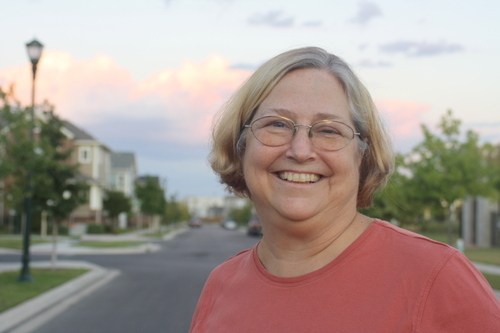
by Mark Frost
“She opens her arms to the poor and extends her hands to the needy.”
(Proverbs 31:20)
May 1, 1998. The speaker, Jack Reese, was relentless. He was addressing a church conference at Pepperdine University in Malibu, California, one of the wealthiest enclaves on earth. My wife, Cheryl, and I were among the crowd of 3,000 mostly-white, middle-class suburbanites listening as Dr. Reese pounded away about Jesus’ dire warnings to the wealthy and His passion for the poor. Jack wouldn’t let us off the hook. He insisted that we were the rich people against whom Jesus inveighed. He offered no simple salve to assuage our guilt, no easy formula to help us justify our hoarded bounty. Instead, he demanded that we wrestle with two key questions: what would Jesus have us do with our wealth, and how are we—in concrete terms—to be Jesus to the poor folks we so easily overlook?
At last, Dr. Reese’s diatribe came to a merciful end and we filed out of the auditorium, grateful to be able to focus on the tasty lunch provided by the university. But Cheryl grabbed my arm and stopped me short.
“I know what I’m going to do about that sermon,” she said, matter-of-factly, “And it’s going to cost you a lot of money.”
Prophetic words from a true eshet chayil. I asked Cheryl what she meant. She explained that Emma, a friend from her days as a school principal, had recently sought her advice about starting a day care center in Detroit. The law in Michigan had recently changed, requiring every able-bodied welfare recipient to seek employment. Emma had witnessed first-hand the unintended consequence of this policy: single parents going off to work and, in the absence of affordable child care, leaving eight-year-olds to watch three-year-old siblings. She knew she had to do something. And Cheryl, during Dr. Reese’s talk, had concluded that it was not enough to merely advise Emma; she needed to dive right in and devote her considerable talents to addressing the need.
From that day on, I had a front-row seat as this woman of valor, along with Emma, founded a ministry called Children’s Outreach. I frequently doubted her sanity during the three years that she labored, without pay, to secure funding and approval for a small day care facility in the poorest section of Detroit. Then I watched, amazed, as she opened another center, and then another, ultimately serving over 100 children and their families.
Soon, Cheryl began hiring women from the communities served by Children’s Outreach, providing them with training and, most importantly, confidence. As they gained skill and experience, they too became women of valor, providing strength and security for their struggling families. Children’s Outreach never missed a payroll, largely because Cheryl never drew a paycheck for the first ten years of its existence. And Cheryl’s prophesy that day at Pepperdine did indeed come true: I wrote a lot of checks to Children’s Outreach over the years, often without knowing how we would meet our own family’s obligations. But God always provided.
Cheryl was diagnosed with pancreatic cancer last July. On March 17 of this year, I kissed her forehead and said a final goodbye to my eshet chayil. My loss is, of course, beyond words. But there’s one thing I have learned: women of valor leave legacies that multiply blessings to families and communities. Children’s Outreach continues as a family-service organization specializing in child-abuse prevention and empowering mothers to rise above the challenges of poverty.
Cheryl also left her mark on our daughter Caren. She has inherited her Mom’s deep compassion as well as her entrepreneurial savvy. Each week, Caren invests hours of volunteer time working as the Director of Business Development for Hill Country Hill Tribers, a non-profit that empowers Burmese refugee women to become women of valor. HCHT provides the resources for them to design, create, and market beautiful handcrafted items, using skills passed down for generations.
As a father, I find special joy in seeing my daughter develop into the same kind of eshet chayil that her mother was. And I know another father who experiences the same joy. He’s Jack Reese, the speaker whose challenge spurred Cheryl to found Children’s Outreach fourteen years ago. Jack also has a daughter. She and my Caren are closest of friends. Her name is Jessica, and she is HCHT’s Executive Director. Who could have known that Jack, through his challenging words, was awakening the woman of valor in Cheryl, while at the same time, through his life of faith, shaping a woman of valor growing up in his home? Or that Cheryl’s example would lead her daughter to enter a partnership with Jack’s daughter that would inspire and equip countless more women of valor?
***
Mark Frost is a semi-retired minister who has served churches in Brockport, NY, Cincinnati, OH, and Trenton, MI. He currently serves a church in Petoskey, Michigan. He enjoys flying, cycling, and playing with his grandchildren.
This post is part of our Women of Valor series. Eshet chayil—woman of valor— has long been a blessing of praise in the Jewish community. Husbands often sing the line from Proverbs 31 to their wives at Sabbath meals. Women cheer one another on through accomplishments in homemaking, career, education, parenting, and justice by shouting a hearty “eshet chayil!” after each milestone. Great women of the faith, like Sarah and Ruth and Deborah, are identified as women of valor. One of my goals after completing my year of biblical womanhood was to “take back” Proverbs 31 as a blessing, not a to-do list, by identifying and celebrating women of valor. To help me in this, you submitted nearly 100 essays to our Women of Valor essay contest. There were so many essays that made me laugh, cry, and think I’ve decided that, in addition to the eight winners we featured in August, I will select several more to feature as guest posts throughout the fall.
We have honored a single mom, a feisty professor, a midwife, a foster parent, an abuse survivor, a brave grandmother, a master seamstress, a young Ugandan woman who reached out to a sister in need, and many more.
Read t he rest of the Women of Valor series here.



November 23, 2012
Women & Christmas
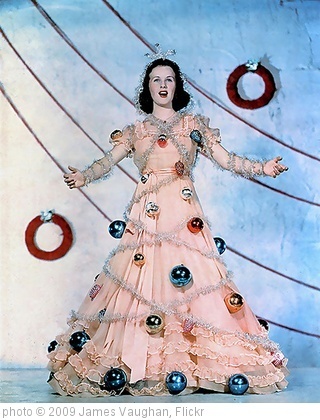
Just for fun, this weekend I'll be posting a few excerpts from A Year of Biblical Womanhood that relate to the holidays. I hope yours are joyous! NOTE: Don't read if you don't have a sense of humor. Wrote this with my tongue firmly planted in my cheek. :-)
***
Okay, I’m just going to come right out and say it: A lot of women secretly hate Christmas.
Now, don’t get me wrong. We love that picturesque moment in which the tree is lit, the fire is crackling, and children outfitted in matching candy-cane pajamas dance around the living room to Tchaikovsky, showing off armfuls of new toys while a twenty-pound ham bakes in the oven; we just hate the anxiety disorder we developed while attempting to produce it.
There seems to be some kind of universal agreement that the advances achieved through women’s liberation need not apply during the holidays. It’s as though the first trumpet peals of “It’s the Most Wonderful Time of the Year” sent blasting over the PA at Bed Bath & Beyond are designed to trigger an internal short that shocks us all into Stepford mode, donning aprons and strained smiles and sweaters that have no business surviving another decade.
From the baking aisle to the post office line to the wrapping paper bin in the attic, women populate every forgotten corner of Christmas.
Who got up at 4 a.m. to put the turkey in the oven?
A woman.
Who elbowed you out of the last reindeer Pillow Pet left on the shelf?
A woman.
Who sent the Christmas card describing her eighteen-year old son’s incarceration as “a short break before college”?
A woman.
Who remembered to include batteries at the bottom of each stocking?
A woman.
And who gets the credit for pulling it all off?
Santa.
That’s right. A man.
Oh, we would be a lot angrier about all of this if we weren’t so tired. But by the time the 25th rolls around, we’re all out of fight. Drained of our humanity, we have more important things to attend to—dishes, returns, disappointed in-laws, and a mild addiction to whatever holiday-themed Starbucks product we were pumping through our systems that year...
Read the rest in A Year of Biblical Womanhood.



November 21, 2012
My “Biblical” Thanksgiving…
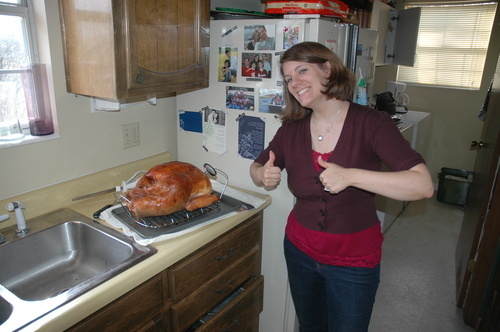
Just for fun, this weekend I'll be posting a few excerpts from A Year of Biblical Womanhood that relate to the holidays. I hope yours are joyous!
***
- from "November: Domesticity"
"It's safe to say that every cook will be called upon to roast a turkey
at some point in his or her life."
- Martha Stewart
I suppose it’s not a good sign when your copy of Good Housekeeping is stuck to the bathroom floor, covered in hair, toenail clippings, and dust bunnies, but by mid November I’d gotten so good at cooking I figured God and Martha would cut me some slack on the cleaning front.
Since completing the beef stew, I’d moved on to desserts, popping chocolate chip cookies, cheesecake, and crème brûlée out of the oven like I was born with oven mitts on my hands. Unfortunately, my dessert domination came to a fateful end the night before Thanksgiving when I attempted Martha Stewart’s double-crusted apple pie. It had already been an intense week, what with a twenty-four-pound turkey to thaw, groceries to buy, centerpieces to assemble, and an apparently monumental decision to make about whether or not to brine. (I’d reveal my final verdict, but it appears this would turn 50 percent of the population against me.)
Now with less than eight hours before my alarm was set to go off the next morning, I found myself on the kitchen floor, crying and cursing and shaking flecks of pâte brisée (French for “pie crust”) out of my hair. (Going into this project, I was determined to avoid the whole crumple-to-the-kitchenfloor-in-a-heap-of-sobs bit, as it’s getting a tad cliché, don’t you think? So I feel it’s important to note that I didn’t crumple to the kitchen floor in a heap of sobs; I just happened to be sitting on the kitchen floor when I started to cry.)
The evening had gone so well up to that point. My friend Carrie, who would be joining us for Thanksgiving dinner, let me borrow her apple peeler—an industrious little contraption that made me feel like Laura Ingalls Wilder as I cranked the iron lever to neatly core, cut, and peel ten Granny Smiths, their cool juices spraying all over my arms like sawdust from a circular. The peels came out in sweet-smelling coils that I munched on as I read Martha’s instructions for preparing the pâte brisée.
“Perhaps because of the risk of overworking,” says Martha, “and turning out something that tears in two or tastes more leaden than light, many home cooks shy away from homemade dough, opting instead for unfold-as-you-go boxed crusts.”
Losers.
“But making perfect pie dough from scratch should be part of any home cook’s basic skills. And the best dough for homemade pies is pâte brisée . . . Getting the right proportion of butter to flour is crucial, as is using very cold ingredients and a light hand.”
Bring it, Martha.
I confess that part of my motivation for tackling homemade apple pie the night before Thanksgiving dinner was the fact that my mother had advised against it.
“At least use a frozen pie crust,” she said. “Why put all this extra stress on yourself?”
But I’d grown overconfident, so the fact that I’d never in my life used a pastry blender or a rolling pin didn’t stop me from going right ahead and whisking together some flour, sugar, and salt, cutting in two sticks of butter, adding some water, and then kneading it all together to form two disks that looked exactly like the picture on page 438, thank you very much. Then I wrapped my pâte brisée in plastic and put it in the refrigerator while I combined my (slightly browning) apples with sugar, flour, lemon juice, cinnamon, ginger, and salt. A taste test proved I was on the right track.
“Assemble the pie,” commanded the directions.
No problem.
I dusted the counter with flour, placed the first pâte brisée on the surface, took out my rolling pin, and began my slow break from sanity.
To this day I am convinced that rendering that lump of dough into a crust that is precisely one-eighth of an inch thick and thirteen inches in diameter would require Douglas Adams–style rematerialization.
I did everything the book told me to do. I rolled the dough from the center out to the edges. I turned it as I went along. I tried using parchment paper. But after thirty minutes of excruciating tedium, I decided that eleven inches in diameter would have to do. I unrolled the paper-thin dough into the pie pan, where it barely peeked over the edges, filled it with the apple mixture, wrestled again with the second round of pâte brisée, and then finally draped the “lid” over the filling.
“Use kitchen shears to trim overhang of both crusts to 1-inch,” said Martha.
Well, I can safely skip that step.
“Press edges to seal.”
Okay.
“Fold overhang under, and crimp edges: With thumb and index finger of one hand, gently press dough against index finger of other hand. Continue around pie.”
This proved challenging given the amount of crust I had to work worth, but by the time I finished, it didn’t look half-bad, almost like Martha’s picture, in fact.
And then I realized I’d forgotten to add the butter to the filling.
Crap.
I immediately got on my phone to tweet about the predicament and solicit advice. Of the dozen or so friends who were online at 9 p.m. the night before Thanksgiving—most of them men—three suggested that I cut the butter into little slivers and stick it through the air slits, which turned out to be a good idea except that my air slits ended up looking more like giant gashes through which butter was bleeding out of my pie.
“Whisk egg yolk and cream in a bowl; brush over top crust,” instructed Martha. “If desired, use cutters to cut chilled scraps into leaves or other shapes; adhere to top of crust with egg wash. This is a good way to hide imperfections.”
Oh, Martha.
“Sprinkle with sanding sugar.”
Sanding sugar, I could only assume, was powdered sugar finely sieved. So I decided to try out a little trick I saw in Martha Stewart Living—a “good thing” as she likes to call it. I took my half-gallon canister of powdered sugar, covered the opening with cheesecloth, held it over the pie, and shook.
Almost instantly the cheesecloth fell through, releasing an avalanche of powdered sugar onto my butter-bleeding pie.
This is when I decided to sit down for a while.
Dan had the good sense to be at a friend’s house, playing Halo that night, so I wallowed alone in self-pity for a while before rousing myself to take a picture of the sugar-doused pie with my phone, tweet about the fiasco, and soak in the sympathy of my readers. Further inspection revealed that just one side of the pie caught the brunt of the disaster, so I began shoveling, first with a measuring cup, then with a spoon, and finally with a butter knife. When I finished, a thin layer of sugar remained, which promptly burned in the oven. Five hours before I was to put a twenty-four-pound turkey in, I pulled a charred, lacerated, butter-bleeding shadow of a pie out.
Icarus had flown too close to the sun.
That night I dreamed about giblets and gravy, and as often happens when I’m so rudely confronted with my perceived inadequacies as a woman, babies. At some point Dan came home and asked if something was burning.
At 5:30 a.m. the alarm sounded, and I lumbered back into the dark kitchen to make some coffee and turn to page 149 of Martha Stewart’s Cooking School, where the recipe for “Perfect Roast Turkey” slowly sharpened into focus
I’d been warned about a million times to remember to take out the giblets, so I heaved the bird out of the refrigerator, placed it on top of a bed of paper towels to sop up all the nasty pink juices, pulled on some rubber gloves, and reluctantly began my day with my hand in a turkey’s orifice. Talk about getting intimate with your meat.
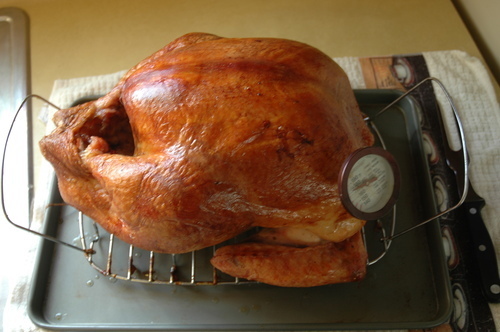
Just as expected, I found the plastic bag of giblets nestled inside the chest cavity, but there was something else rattling around in there I wasn’t so sure about, some kind of bone. The package instructions seem to suggest it was the poor gal’s neck, but I called the Butterball Turkey Talk-Line just to be sure.
The Turkey Talk-Line was busy, probably because 6:00 a.m. on Thanksgiving morning is about the time most of us first-timers realize what we’ve gotten ourselves into. Fortunately, the menu included on option to listen to Betty or somebody talk about how to prepare a turkey, and I distinctly heard her say to remove the giblets and neck. So I pulled out the neck, ignored Martha’s instructions to reserve the offal for gravy, and threw it with the giblets into the garbage. (We Southern girls make our gravy out of grease, not body parts.) I prepared my basting liquid, seasoned the cavity, lathered the bird in butter, and placed it in the roasting pan.
But something didn’t look right. The poor thing appeared to be attempting flight.
I read back through Martha’s instructions to see “fold wing tips under.”
This proved to be the hardest part of the whole process because apparently I’m so weak I can’t even arm wrestle a dead turkey, but also because the rest of the day went . . . well . . . perfectly.
My parents came over, along with our pastor, Brian; his wife, Carrie; and their two young daughters, Avery and Adi. Carrie brought a pumpkin pie and banana pudding, so we didn’t have to eat my butter-bleeding apple pie. The table looked beautiful, all the food came out on time, the turkey was tender and juicy, and the conversation was fantastic.
Everything went so perfectly I started to annoy myself. How am I supposed to get any writing material out of this?
Or maybe it was my definition of “perfect” that had changed.
Somewhere between the chicken soup and the butter-bleeding pie, I’d made peace with the God of pots and pans—not because God wanted to meet me in the kitchen, but because God wanted to meet me everywhere, in all things, big or small. Knowing that God both inhabits and transcends our daily vocations, no matter how glorious or mundane, should be enough to unite all women of faith and end that nasty cycle of judgment we get caught in these days.
Mom and Carrie helped me with the dishes. Brian volunteered to pick apart the carcass. Avery and Adi learned to play “Living on the Edge” on Guitar Hero with Dan and Dad.
Finally, after the company was gone, the dishes done, and the leftovers distributed, I sank into the living room couch with a glass of rosé and offered up a silent toast—to Mary, Martha, and me.
From A Year of Biblical Womanhood ©2012 by Rachel Held Evans; published by Thomas Nelson. Used with permission. All rights reserved.



November 20, 2012
Why we have to make a better case for gender equality in the Church
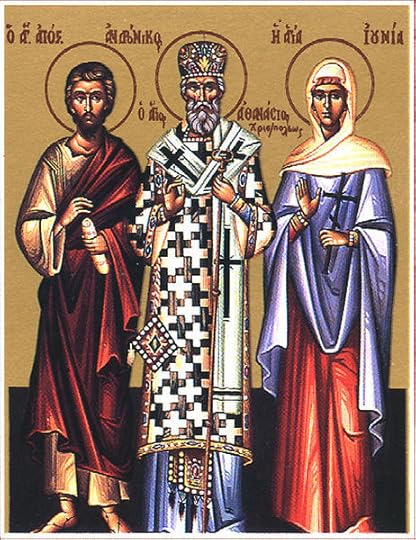
Sadly, today The Church of England general synod voted
against appointing women as bishops. Granted, there are female bishops in the Episcopal Church here in the U.S., but a blow to our sisters in the UK still feels like a blow to us all.
As I listened to the arguments
online this morning, (late afternoon in the UK), I was struck by how few—on
either side—appealed to Scripture to make their case. I couldn’t help but wonder
what the apostle Junia would think of all of this!
I believe, with every ounce of my being,
that patriarchy is a manifestation of a fallen, broken world and that a new creation in which “there
is neither Jew nor Greek, male nor female, slave nor free, for all are one in
Christ Jesus” began at the resurrection, an event first announced to the world by women. I believe that while the apostle Paul
instructed some women not to teach, he encouraged others to prophesy, teach,
and lead, and so we have to look at the epistles in their totality and in their
context rather than lifting a few verses out to restrict women from preaching
the gospel.
Today was just a reminder that there’s a
lot of work to be done. I know that votes like these can make Christian women
feel like less-than, but I believe, deep in my bones, that things will get better
for women in the Church. And to those clergywomen who continue to serve tirelessly everyday--thank you.
If you’re interested, here are some links
to our Mutuality 2012 Series, which explores the topic--and some of its relevant biblical texts--more thoroughly:
Week of Mutuality: How it will work, definition of terms
Let’s start at the beginning, shall we? (Genesis 1-3)
4 Common Misconceptions About Egalitarianism
Submission in Context: Christ and the Greco-Roman Household Codes
Dan on roles, leadership, and supporting your partner (Dan Evans)
Who’s Who Among Biblical Women Leaders
For the Sake of the Gospel, Let Women Speak (1 Timothy 2:11-15)
Ask an Egalitarian...(Mimi Haddad)
Is patriarchy really God’s dream for the world?
When Men and Women Ministered Together as Equals (Ed Cyzewski)
Women of Valor: It’s About Character, Not Roles (Proverbs 31, Ruth)
And you can always check out A Year of Biblical Womanhood for a creative examination
of what the Bible says about women.



November 19, 2012
The Real ‘Evangelical Disaster’
When Republican Governor Mitt Romney lost the presidential election earlier this month to incumbent Barack Obama, Al Mohler, president of Southern Baptist Theological Seminary classified the election as “an evangelical disaster.”
Concerned also by state measures legalizing gay marriage, Mohler said that, aside from the 79 percent of white evangelicals who voted as they should, the “[evangelical] message was rejected by millions of Americans who went to the polls and voted according to a contrary worldview.”
"If we do not become the movement of younger Americans and Hispanic Americans and any number of other Americans, then we will just become a retirement community," he told NPR. "And that cannot, that cannot, serve the cause of Christ."
As a young evangelical myself, I confess I have grown tired…no, weary…of responding to comments like these with some honest suggestions for how my fellow evangelicals might avoid said retirement, only to be discounted and disparaged for believing the earth is more than 6,000 years old, for voting for Democrats from time to time, and for daring to serve communion to gays and lesbians. The fact that I can affirm the Nicene and Apostle’s creeds, that I am an imperfect but devoted follower of Jesus Christ, that I am passionate about spreading the gospel, and I believe the Bible is the inspired and authoritative Word of God, and still my evangelical credentials are constantly being questioned and debated reveals just how narrow evangelicalism has become.
The word evangelical means, in the Greek, “gospel” or “good news” (evangelion). And so an evangelical, in the most basic sense of the word, is simply someone who is committed to spreading the good news that Christ has died, Christ has risen and Christ will come again. There are plenty of Hispanics, plenty of young people, plenty of African Americans, plenty of Republicans, plenty of Democrats, and plenty of people around the world who believe this to be true, and yet Mohler will not be satisfied until American evangelicals become a monolithic and reliable voting bloc that keeps his preferred politicians in power.
This, I believe, is the real evangelical disaster—not that Barack Obama is president and Mitt Romney is not, but that evangelicalism has gotten so enmeshed with politics, its success or failure can be gauged by an election.
It’s this idea the “cause of Christ” is to vote against gay marriage and for tax cuts, and that the hope of evangelicals lies in election day returns. It's this idea that a Christian worldview is something we can vote for because it fits on a ballot.
When I tell a reporter or a new acquaintance that I am an evangelical, inevitably the person will respond, “Oh, so you are a Republican?” Sadly, evangelicalism has ceased to represent the Kingdom of God, which transcends all political parties and national allegiances, and has come to represent kingdoms of this world. And so the strengths and weakness of evangelicalism are conflated with the strengths and weaknesses of the Republican Party.
The great evangelical disaster is that evangelicalism has become synonymous with Republicanism rather than the gospel of Jesus Christ.
This happened long before the 2012 presidential election.
It happened when we turned the Bible into a conservative position paper and Jesus into a flag pin.
It happened when Liberty University invited Donald Trump to speak in chapel because devotion to the GOP matters more devotion to the teachings of Jesus .
It happened when we traded the good news that Jesus Christ is Lord to the bad news that our influence in this world is limited to how much power we can grasp.
It happened when we restricted “Christian values” to one or two social issues while leaving others out.
So I will try one last time.
Want to win young people back to evangelicalism?
Then start preaching the Gospel again.
Start preaching the gospel that Jesus Christ is Lord and Caesar is not.
Start preaching the gospel that drew both tax collectors and zealots—political enemies— to Jesus’ side.
Start preaching the gospel that God so loved the world that God became flesh and lived among us, taught among us, loved among us, died among us, and rose again among us.
Start preaching the gospel that through Jesus, we find reconciliation with God and with one another.
Start preaching the gospel that they will know we are Christians by our love—not by our votes, not by our protest signs, not by our power, not by our campaign contributions—but by our love.
But fair warning: If you start preaching this gospel—this gospel of reconciliation and peace—you will attract more than just Republicans. You will attract people of all backgrounds and races, political persuasions and theological preferences. You will attract rich and poor, slave and free, male and female. You will attract people like me who are concerned about defending not only the unborn, but also the poor, the sick, the immigrant, and the war-torn. You will attract people like me who love Jesus but know that no single vote, no single political party, can represent my values in their totality or bring the kingdom of God to pass.
If we start preaching the gospel again, we will have to get used to ethnic, theological, and political diversity because we will share our lives with people whose ultimate allegiance lies with something greater than a political party, greater than a ballot measure, greater even than the highest office in the world.
We will share our lives with citizens of the Kingdom of God.
We will be evangelists, bearers of good news.
And no matter what happens in the halls of power, we will never be part of a disaster. Instead, we will be part of a stubborn and relentless movement of hope—the kind of hope that can heal the world.
We will be true evangelicals.



November 18, 2012
Sunday Superlatives 11/18/2012
Best Video:
“2 Year Old Dancing the Jive”
Best Photo:
Obama and McKayla Maroney Are Not Impressed
Best Profile:
John Blake at CNN features the relationship between Charles and Andy Stanley
“'Every Sunday I had to preach, no matter what,' Charles says of those days when he was going through the divorce. 'I couldn't get up and say I had a horrible day yesterday. It kept me in the Word of God -- praying, trusting God, watching people saved and watching the church grow.'"
Best Analysis:
Margaret Mowczko with “Plutarch and Paul on Husbands and Wives”
“As I was reading and comparing Advice with First Corinthians it struck me how different Plutarch’s and Paul’s views were about the relationship between husbands and wives. It also struck me that many Christians sound much more like Plutarch, rather than Paul, in what they think and say about marriage and women.”
Best Conversation-Starter:
Roger Olson with “Is Open Theism a Type of Arminianism?”
“I’ve often wondered why open theism, of all things, led to such hysteria (and sometimes outright dishonesty) among its critics. One thing I suspect is that many Calvinists realized that if many evangelicals adopted open theism, one of their strongest arguments against Arminianism would be nullified—that Arminianism cannot explain how God foreknows future free decisions of creatures without in any way determining them.”
Most Encouraging:
Family Christian Stores pledges all profits to widows and orphans
Most Informative:
Preston Sprinkle over at Jesus Creed with “Evangelicals, Militarism, and Romans 13”
“First, Romans 13 does not speak of Rome’s warfare policy against foreign nations, but of its police and judicial action toward its own citizens. Paul’s phrase “bear the sword” (13:4) refers to police action within a government’s jurisdiction, not warfare outside its territory. Using this text to support, for instance, America’s war in Iraq goes beyond what Paul is actually saying. Waging war against another nation—even in the name of preemptive strike—does not reflect Paul’s point in Romans 13...”
Most Challenging:
Andrew Huth’s photos and reflections on Sandy relief
Most Enlightening:
Christianity Today with “The 'Benevolent Sexism' at Christian Colleges”
“Many women faculty on the evangelical campus in the study reported feeling undermined at work by implicit assumptions that they should be home with their children, or that the qualities that are valued in academia—intelligence, assertiveness, and confidence—are not traits appropriate for Christian women. So while women at this university generally report warm friendly relationships with male faculty and students, they also feel limited support for their professional achievement because of traditional gender assumptions.”
Most Thoughtful:
Marty Troyer with “More fighting in Jesus’ neighborhood this week”
“In a previous blog post – Your thoughts on Israel-Palestine? – I asked you to share not what you believe, but why you believe what you believe. Your answers are as diverse as anticipated, ranging from scripture to history to politics to personal experience. For those who answered, Scripture played a heavy roll. But you most certainly did NOT use the same texts or core arguments. Indeed, what I said in the blog is clearly true of us, “There are, if its not obvious, different ways of looking at the past and the future of Israel and Palestine…Well meaning and committed Christians differ radically on what our faith suggests we should do.” Responders based their reasons in at least 5 very different Biblical principles..”
Most Heartbreaking:
Lara Aburamadan at The New York Times with “Trapped in Gaza”
“And all the while, we hear bombs. Bombs that bear autumn’s scent and winter’s chill. Bombs that batter. Bombs that kill. I still have waking nightmares of the bombs that tore through our sky nearly four years ago, when a classmate, Maha, lost her mother in an Israeli strike. And a childhood friend, Hanan, who saw her mother’s leg severed under the rubble from another strike.”
I contacted Ahava, my friend from Israel, to see how she was holding up. Here’s an excerpt from her responses:
“it wasn't affecting us too much until Friday night right after lighting candles for Shabbat the air raid sirens blared out and we had 90 seconds to get our kids to the safe room (our entryway). Two rockets landed about 8 miles from our front door. Pretty scary. So, I packed us a go bag over Shabbat, just in case, and we've been drilling the kids what to do if they hear sirens (close the metal shutters, go against the wall, hands over head, wait for Abba and Imma). The girls have already been doing drills in school, so they aren't too scared. I'm just thankful we don't live farther South. One friend of mine from that area was complaining that every time she puts a cake in the oven to bake they get a rocket nearby and the cake falls from the explosion. now that's intense.”
Most Relatable:
The Oatmeal with “Making Things”
[WARNING: Profanity]
Wisest:
Sarah Bessey with “In which I tell you the truth about telling the truth”
“Let me lay a bit more truth on us: truth and love are not mutually exclusive. Truth isn’t the heavy-handed Papa here to lay down the discipline. Real truth sets free, truth invites, truth locks hands with grace, kisses love, and outlasts all of the fashionable Facebook rants and fear-baiting rhetoric, all of the splinter-spotting by the plank-in-the-eye crowd.”
Bravest:
Glennon Metlton with “There will be no eclipse”
"Then I decided that there is nothing shameful about being human. That we are each broken and each beautiful, and that we really do have similar longings, feelings, traumas, flaws, gifts, fears and secrets. And I learned that we stay as sick as our secrets. So I turned my insides out and I started writing. And my truth started setting others free to share their truths. And with that, I did my little part to help the world be free-er. That’s what I do here. I do my part.”
Smartest:
Krista Dalton with “The Christian appropriation of Judaism”
“To be fair, this approach often comes from good intentions. Christians discover the realm of 'Jewishness' as it crosses their plane of Christianity, and they attempt to plug pieces of 'Jewishness' into their story: such as the 'Jewishness' of Jesus, the 'Jewish' Passover behind Easter, and the 'Jewish' authorship of Paul. But this attempt to formulate “Jewishness” isn’t the same as understanding Judaism.”
Truest:
Ann Voskamp with “The Song for All the Women”
“They’re here right next to me — all these women rejected for the size of their pants, the size of their house, the size of their family, the size of their work. Women brushed off because they live too large or they live too small, because there is more of them than people know what to do with, because they can’t or don’t or won’t fit into someone else’s box…”On the blog…
Most Popular Posts:
“Sisters, Speak…” and “Why ‘A Year of Biblical Womanhood is a NYT Bestseller”
Most Popular Comment:
In response to “My interview with Mary Kassian,” Megan wrote:
“I confess I'm not terribly familiar with Mary, but from what I know she seems like a rather sensible and smart woman. I did read her review of Year of Biblical Womanhood. I can see why she'd be frustrated that her vision of submission wasn't given space in the book, but ultimately her frustration is misplaced. If she's frustrated that submission is equated with brainlessly and meekly taking whatever the man dishes out, Rachel's the wrong one to complain about. Mary should be complaining about a certain vocal, respected, mainstream proponent of complementarianism (male, naturally) who says that submission does mean tolerating abuse. While the Pipers and Driscolls of the world frustrate me as an egalitarian, if I were a moderate complementarian I think they'd frustrate me even more. If complementarianism is being "misrepresented," it's by these men, not by Rachel. But we rarely hear pointed criticism of them (Driscoll excepted, but then it's mostly because he's so pervy, not because there's any fundamental disagreement on his views on submission). I get that there's always more affinity for those on your "side" even when you disagree, but really. If complementarians spent half as much time on getting their own house in order as they have hyperventilating about this book, they'd have a lot less "misrepresentation" to fear.”
So, what caught your eye online this week? What’s happening on your blog?



November 17, 2012
Madeleine L'Engle – A Woman of Valor
By Catherine Trieschmann
I don't remember how the book came to be in my hands, where I bought it, or if it was a gift, but I can recall with great clarity the moment I read the first chapter. I was standing outside the Johns Hopkins Library in Baltimore, Maryland on a crisp September morning, and as I read, I saw a vision of how life might be led, and I wanted to follow it.
The book was The Irrational Season from the Crosswicks Journals and the author, my woman of valor, was, of course, Madeleine L'Engle.
If you ask any Christian woman of a certain age with literary aspirations about her influences, chances are Madeleine L'Engle will be at the top of the list. The reasons for this are both as varied as the individual writers themselves and as singular as L'Engle's voice.
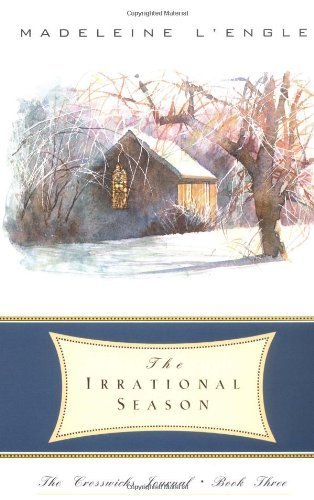
My particular circumstances at the time--young, single, living in an urban environment, trying to hack out a living in the theatre--eerily paralleled (or so I fancied) L'Engle's early years in New York, when she worked as an actress, surreptitiously writing in dressing rooms and hotels rooms. When I moved to New York City the next year, I kept The Irrational Season in pocket. Her descriptions of finding the holy in the dirt and degradation of urban dwelling served as a talisman of sorts. L'Engle gave voice to the particular compress of guilt, compassion, helplessness and pity that knocked me sideways every morning when I stepped over the homeless woman drifting in and out on her cardboard bed. When I wanted to turn to despair, Madeleine L'Engle would whisper in my ear: This woman is a child of God, too. Just smile. Lay an orange in her hand.
More than common circumstances, however, what drew me and so many other young writers to L'Engle was her articulation of the writing life as a sacred art. She understood that writing was akin to prayer, that it involves pushing out the conscious self in order to tap into the irrational, the unconscious, the holy, indeed, the force of creation itself. If this sounds audacious, it's because it is--especially if you're a young woman as uncertain of your place in the world as you are of your prose. In her journals and essays, she empowered a generation of women to define their craft as vocation, equal to the call of ministry, and even more radically, equal to the call motherhood. And then she wrote about the difficulty of writing while rocking her babies, and how it tears the heart in twain, and when I, too, became a mother, I re-read those passages in A Circle of Quiet over and over, not because they were poetic or clever or ground-breaking but because they were true.
L'Engle spoke of writing in the language of Anglican spirituality, yet her audience was ecumenical, non-denominational, universalist, pluralistic, multicultural, translated into many languages. Perhaps no other Christian writer since C.S. Lewis broke down the divide between secular and sacred so thoroughly. In this way, her young adult fiction was missional, even if she, or her publishers, never called it such. What you read when you are young shapes you, plants seeds of longing inside your being that never go away. You can't open A Wrinkle in Time without longing to know the warmth of a New England farmhouse on a cold and rainy night. You can't close A Wrinkle in Time without longing for wholeness and unconditional love.
Though I haunted her neighborhood when I moved to New York and even frequented her church, I never met Madeleine L'Engle. I feel confident, however, in asserting that she wasn't a Saint. In articles about her, friends and family call her brilliant and incisive but also abrasive and stubborn. They say she was endlessly creative and dedicated to her craft but also prone to blur fact and fiction. Her children contest the reality of the home life drawn in her memoirs; I imagine they have a point. She suffered great loss: the death of her husband, Hugh Franklin, to cancer; the untimely death of her son, Bion. I imagine these tragedies took their toll, as tragedies do. Her flesh and blood self was undoubtedly more complicated and contradictory than the self she paints in her books, than the Madeline L'Engle I pieced together in my imagination--part her, part me, part longing. Yet I can't help wondering if maybe our Saints are equally complicated; if, in fact, they aren't entirely Saints at all. Maybe our Saints are stories, and if that's so, then perhaps storytellers are really the ones with all the power. Madeleine L'Engle knew this and was brave enough to share it.
***
Catherine Trieschmann is an award-winning playwright who lives in Hays, Kansas with her husband, two daughters, and the wind. Her plays, How the World Began, Crooked, and The Bridegroom of Blowing Rock are published by Samuel French, Inc. You can read her monthly column on writing and parenting at www.howlround.com, or follow her on twitter @ctrieschmann.
This post is part of our Women of Valor series. Eshet chayil—woman of valor— has long been a blessing of praise in the Jewish community. Husbands often sing the line from Proverbs 31 to their wives at Sabbath meals. Women cheer one another on through accomplishments in homemaking, career, education, parenting, and justice by shouting a hearty “eshet chayil!” after each milestone. Great women of the faith, like Sarah and Ruth and Deborah, are identified as women of valor. One of my goals after completing my year of biblical womanhood was to “take back” Proverbs 31 as a blessing, not a to-do list, by identifying and celebrating women of valor. To help me in this, you submitted nearly 100 essays to our Women of Valor essay contest. There were so many essays that made me laugh, cry, and think I’ve decided that, in addition to the eight winners we featured in August, I will select several more to feature as guest posts throughout the fall.
We have honored a single mom, a feisty professor, a midwife, a foster parent, an abuse survivor, a brave grandmother, a master seamstress, a young Ugandan woman who reached out to a sister in need, and many more.
Read t he rest of the Women of Valor series here.



November 16, 2012
Why “A Year of Biblical Womanhood” is a NYT bestseller…

Things are finally returning to normal over here at the Evans household (normal = no hurricanes, Whoopi encounters, or mad dashes through Terminal E for Eternity in the Charlotte airport). This means we’ll soon be getting back to our regular posting schedule here on the blog, so look for the Esther series and “Ask a…” series to return after Thanksgiving.
As we wrap up the initial launch of A Year of Biblical Womanhood, I wanted to say thank you. Your ideas, enthusiasm, support, and mad networking skills helped catapult the e-book version of A Year of Biblical Womanhood to #18 on the New York Times Bestseller list. This is a dream come true for any writer, of course, but even more meaningful than making the elusive “list” has been hearing the stories of readers impacted by the book. My heart swells every time I see women celebrating one another with hearty declarations of “eshet chayil!” or hear from readers who, for the first time in many years, feel drawn to the Bible again. And when I look ahead to upcoming books from first-time authors like Sarah Bessey, Elizabeth Esther, Glennnon Melton, Micha Boyett, and others, I feel so privileged to be part of what I consider a movement. The book is starting conversations, not because of me or because of you, but because of US! Your voice matters. My voice matters. And together we can make big changes happen.
I’ve especially enjoyed seeing the more creative ways in which you have interacted with the book—making your own challah, discussing hermeneutics, retelling the stories of biblical women, forming book clubs, even getting tattoos! So below is a compilation of just a few of my favorite responses to the book. Please feel free to add your own, or another favorite, in the comment section. (Special thanks to my amazing Launch Team for helping keep track of all these reviews!)
Again, I don’t know what else to say besides thank you.
So…thank you.

“…For the first time in my life I feel like a Proverb 31 woman. I feel like I may actually make the cut.”
“In each chapter, I found myself searching my own heart and remembering that whether I do it from the end of a spatula or a scalpel or a pen, my true calling as a woman is to bring glory to God.”
“Ladies, do you hear this? Becoming like the Proverbs 31 Woman is not about WHAT you do, but HOW you do it…I was so buoyed up by this idea and have kind of been floating on the liberating feeling of it and the power of the blessing of ‘Eshet Chayil’! I shared this with Mr. Ford and the first time he called me a Woman of Valor after a particularly grueling day working with 3 little ones, I nearly burst. And I began to think about all of the incredible, brave, strong, valorous women in my life and felt an overwhelming urge to run around shouting ‘Eshet Chayil’ over all of them, because I want them to feel empowered to continue to live out their Womanhood in the valorous ways that they ALREADY are. So I'm just gonna do that right here on my little blog…"

“The results are really, truly funny. And it’s the best kind of humor, too—you know, when a brilliant storyteller tells you about some hilarious incident, and you just can’t help but laugh out loud in spite of yourself. I read portions of this book to my very ill mother, who can barely speak, and even she laughed out loud. This is a book that makes you feel good.”
“This is a fierce and fearless book.”
“This book made me want to run to my Bible with a renewed sense of excitement to find the stories of women rarely mentioned in the Sunday-morning service. It made me want to do further research into several theological concepts mentioned. It made me want to meet a bunch of friends at Starbucks and have a lengthy conversation about our roles in the church and life. However, it did not make me want to start calling Charlie “master,” about which he was only mildly disappointed.”

In the past year, I've gotten really into canyoneering. Last spring, I went to Phoenix to visit some friends. My friend Kristin and I met this guy Jason (in a canyon, actually), and he took us through a few canyons in the area. We did this one called Zig Zag that ended in a 500 foot rappel. At the time, I was not a fan of heights (canyoneering has since gotten me over that fear) and had only rappelled one other time. I rocked that 500 foot rappel and sang a song while doing it.
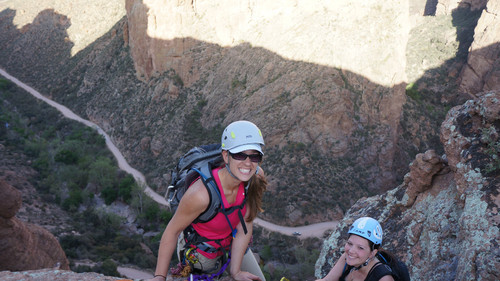
As we walked to the car, helmets in hand, harnesses jangling, the sun setting behind us, I thought, "Eshet chayil. I need that tattoo." I talked to Rachel, my best friend and female soulmate, about it the next day. She'd just gone through a really rough patch in her marriage, and now that tattoo will always be a symbol of that. So we made sure we got the Hebrew right and got the matching tattoos a few days later.
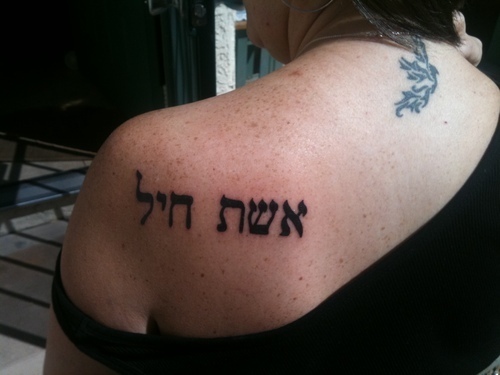
Both of us agree that it is our favorite of our tattoos. I've been on this whole "Fearless" kick lately, and it's a powerful reminder for me. And I've gotten so many compliments on it, from a theology student at a line dancing place in Indiana, to a woman from Jerusalem on a trail at Yosemite. I even met a guy in Vegas who kept trying to communicate how powerful it is. He was afraid I didn't know what it meant.
One of the girls in my small group was just talking about how Proverbs 31 makes her feel so inadequate... I can't wait for her to read what you have to say about reclaiming it!
- Erin Bramscher

“With a word we can kill one another. With a few more words, we can resuscitate one another. The words in A Year of Biblical Womanhood are resuscitative.”
“Let me tell you something: Dan challenged me to be a better husband to my wife far more than any literature from Focus on the Family or Desiring God could ever do. Dan is the ultimate team player. He supports Rachel. I gain from the book that he makes Rachel a better person and she makes him a better person. One can critique egalitarian marriages, but the fruit of the Spirit seems to be blossoming in the midst of their relationship, so do what you will with that. As I read his thoughts he made me ask myself if I am doing all that I can do to help Miranda become all that God has made her and whether I have supported my wife in her giftedness. Someday I’d like to meet Dan, give him a big handshake, and thank him for existing.”
“While reading the book, I felt the need to define roles to be less and less important, and my desire to become like Christ to be more and more significant.”
From Brooke M. Jackson on Facebook: Made some challah to share with friends; and won over a hesitant reader this week who was inspired to join our Dec. 1st discussion after reading a "review" by someone who didn't read the book.

“This book did for me what so many books about being a Christian woman have failed to do. It reminded me that I am not broken, that it was with purpose that God designed a loud mouth like me for this time and place. It managed to honor all women for all gifts, and all places in life.”
“So, imagine my surprise when I opened up A Year of Biblical Womanhood, to find that it was a fun and yet very thoughtful read about what it means to be a woman? Nowhere was there an attack on the Church or the Bible. Rather, it was one woman’s story about her journey to both make sense of what the church has told us the Bible calls us to be as women, and to truly understand what God’s Word actually has to say about women. Where there were differences, Evans handled them with Grace.”
“While I was already dipping my toes into the egalitarian waters, Rachel’s journey invited me to dive in. In her book, she invites all of us, women and men, to dive in.”
"Rather than a rant against the Bible, readers will quickly see that Evans has found some deep source of wisdom in this process, and the big lesson learned is applicable to everyone: Taking the Bible seriously does not mean “do what it says.” No one lives that way, even hardened literalists. Taking the Bible seriously means reading it with discernment and living it out responsibly, and no biblical injunction concerning women is immune. Tracing what the Bible says or implies about women brings to the surface this unavoidable hermeneutical process."

“The book is a game-changer, a turning point, and it’s a damn good read. Fascinating, funny, erudite, wise, complex, I couldn’t put it down.”
“But God is not honored by infighting, and this book is not intended as ammunition is anyone's battle. Rachel writes not to fan flames but to loose chains.”
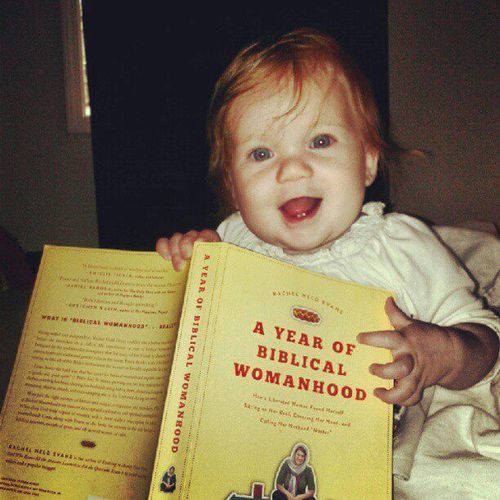
“Like so many evangelical women, I've faced hurtful accusations when I push back against the status quo. Sometimes I don't have the words or the grace-under-pressure to articulate what I believe. And many other people in the church who are not white straight men fight a similar battle. Thankfully, you do have the ability to speak so clearly when others are still tending to their wounds and can only offer a quiet ‘Me too.’”
“Because if you listen, you will begin to hear the marked silence of so many people who feel voiceless. You will hear the grace in Rachel’s words. You’ll hear Proverbs 31 not so much as a to-do list, but as a poem. You’ll begin to understand that soundtrack to A Year of Biblical Womanhood, to the Christian life in general, is love.


“Valor can be expressed through many callings, and men like myself should be honoring whatever ways our sisters are valorous instead of trying to pigeon-hole them into specific roles.”
"Rachel Held Evans is not just another woman using the Bible to write about women’s experiences. She actually is quite adept at Biblical interpretation and has done some good reading and research and exegetical spade work when she is dealing with any kinds of Biblical texts, including the so-called ‘texts of terror’. Whether you agree with her interpretations or not, they are always possible, and often plausible and fair and deserve respect and close scrutiny."
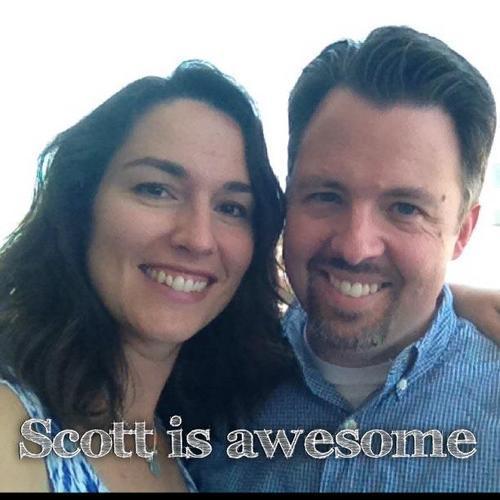
from Joy Bennett
“I got the book, began reading and immediately got nervous. I would label myself a fairly conservative, evangelical Christian who relishes her job as a stay at home mom and housewife. Is this the exact kind of person Rachel’s book was going to be speaking against? My feathers started getting ruffled, but I kept reading. I kept reading because I honestly couldn’t stop…”
“Rachel Held Evans tells the stories of women who overcame much in order to improve the lives of those around them. I want to do that.”
“So perhaps Rachel isn’t hiding in your church right now, but you’d better believe that everything Rachel writes about is out there in our churches. It’s not like Rachel is some lone voice in the wilderness stirring up trouble. She’s putting into words the very conflicts, struggles, and desires that are pulsating throughout many congregations.”
“really, the best gift we can give rachel is to live the solution, to say what needs to be said and do what needs to be done. to try, to experiment, to engage, to rock the boats in our churches & our circles of influence, to gain strength & courage from God to step into places we’re not used to stepping, to say things we’re not used to saying, to live out our faith in ways we’re not used to living. and to let her know how she played a beautiful part from afar in inspiring change.”



November 14, 2012
Sisters, Speak
(...because a reporter asked what I would say if I could say one thing to the women of the Church.)
Wake up, wake up, Deborah!
Wake up, wake up, sing a song!
Sisters, speak.
Speak for the lonely, the forgotten, the poor, and the frightened.
Speak for women silenced by patriarchy, denied an education, displaced by war.
Speak for the widow, the orphan, the immigrant, and the refugee.
Speak for your sisters, your brothers, your daughters, your sons, your friends, even your enemies.
Speak, sisters, for yourselves.
Speak with the voice of the Prophetess Deborah, a mother of Israel and mighty warrior, who was brave when Israel was weak, and whose victory song declared, “I, even I, will sing unto the Lord.”
Speak with the voice of the Hebrew midwives, who defied Pharaoh to save the helpless.
Speak with the voice of the Shulamite girl, who in poetry celebrated the beauty of her own body, though it bore the marks of rural life that drew the scorn of many.
Speak with the voice of Jephtah’s daughter, for hers was quieted too soon.
Speak with the voice of Mary of Nazareth, whose obedience magnified the Lord, bringing sight to the blind and light to the darkness.
Speak with the voice of Mary of Bethany, whose discipleship broke with convention but whose valor in sitting at her rabbi's feet will never be taken away from her.
Speak with the voice of Mary Magdalene, Apostle to the Apostles and the first to shout to a waking world, “He is risen!”
Speak with the voice of Apostle Junia, who though she was silenced for centuries at the hands of scribes, speaks once again.
Sisters, speak.
Speak with valor.
Speak with love.
Speak with gentleness.
Speak with wisdom.
Speak the Gospel.
Speak grace.
Sisters, speak.
Speak alongside your brothers, not as subordinates or as rivals, but as partners—co-workers in the mission.
Speak into this world all that is lovely and brave, all that is beautiful and true, all that is joyous and life-giving and useful and good.
Sisters, speak, even when they try to silence you, when they belittle you, when they say all kinds of evil things against you, sisters, speak.
Speak like the Spirit-filled daughters you are, and God will show wonders in the heavens above and signs on the earth below.
Sisters, speak.
Speak, and the voices you once thought small will echo big and loud in the chorus of a great cloud of witnesses.
Speak, and watch the mountains move.
***



My interview with Mary Kassian (and other cut material)
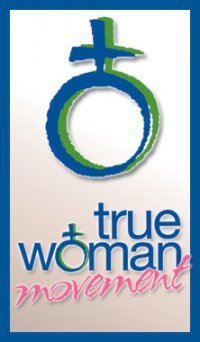
As I have mentioned before, my editor and I cut a whopping 50,000 words from A Year of Biblical Womanhood. This was a painful process indeed, but one that ultimately made the book leaner and cleaner. Casualties included a story about practicing the Sabbath, an account of the Puritan ducking chair, an interview with a courtship couple, an in-depth look at the it-couple of the Early Church (Priscilla and Aquilla), and and a far too detailed description of the beautiful grotto at St. Bernard Abbey in Cullman, Alabama
Another casualty was my interview with Mary Kassian and my experience at the True Woman conference. Mary and I disagree on a lot of things, but we respect and like one another despite those differences. Mary has expressed disappointment that her organization’s vision of biblical womanhood was not presented alongside some of the other complementarian groups I feature in the book, like The Council on Biblical Manhood and Womanhood, The Vision Forum, The Danvers Statement, Debi Pearl, Dorothy Patterson, John Piper, Wayne Grudem, the contributors to Recovering Biblical Manhood and Womanhood, and others.
My book was never intended to be a polemic against complementarianism, (the word is only used once in its 315 pages), so I don’t spend a great deal of time fleshing out all the nuances and differences of the movement, though conversations in response to the book have revealed these nuances and differences to be many. (I was under the impression that the Council on Biblical Manhood and Womanhood was considered a mainstream representation of complementarianism, but perhaps I am mistaken.)
Still, I take the responsibility of accurately representing other people’s views seriously, so in hindsight, I probably should have made space for this enlightening interview with Mary Kassian. So I’ve decided to share that in the first link below, along with links some of the other material that ultimately got cut from the book. Perhaps in future editions, I’ll get the chance to include more of these!
Tomorrow I’ll be sharing some of my favorite pictures, tweets, reviews, and responses to A Year of Biblical Womanhood, as we finally WRAP UP the launch!
Biblical Ways to Lose A Body Part



Rachel Held Evans's Blog
- Rachel Held Evans's profile
- 1710 followers























